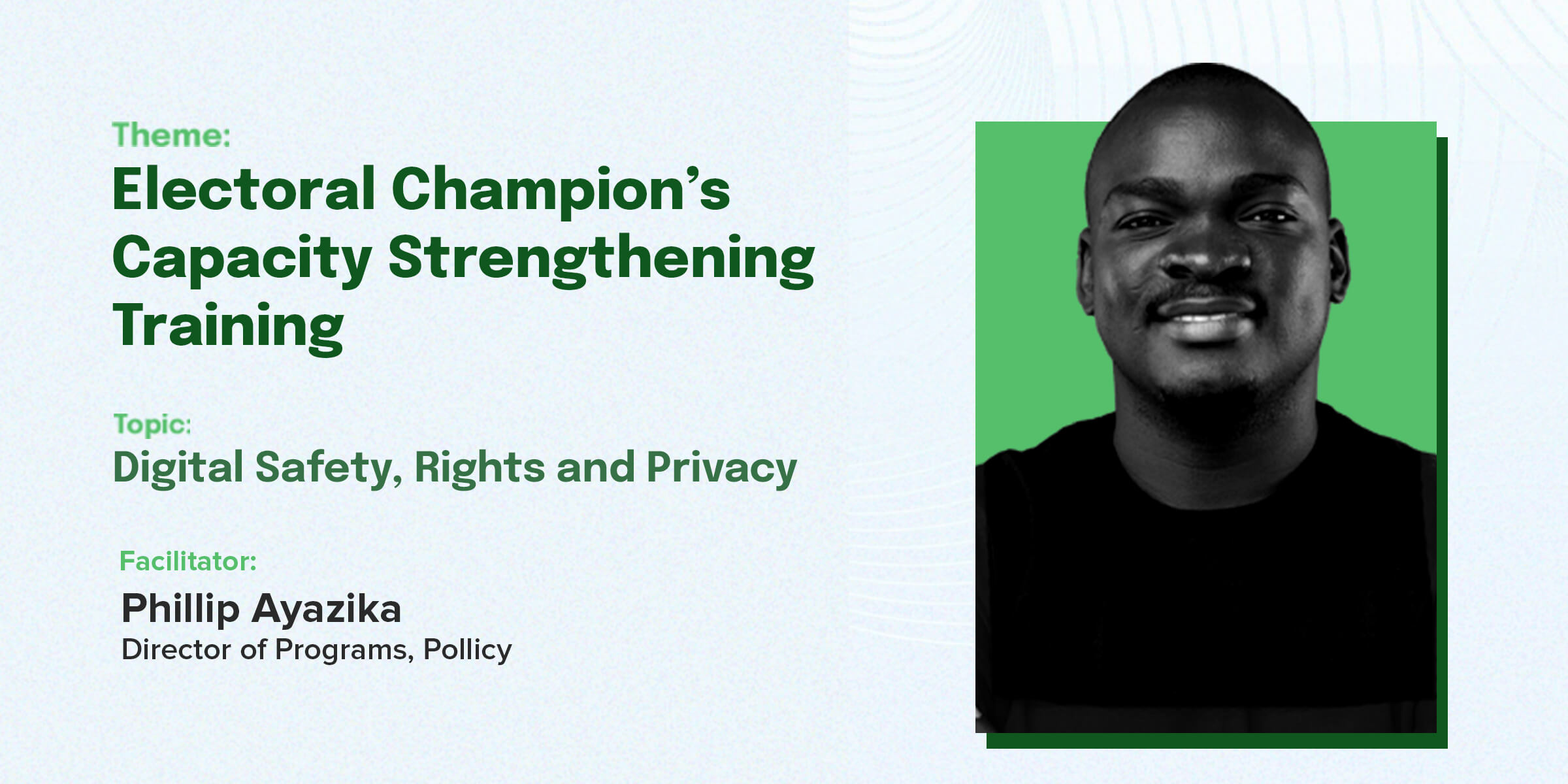In today’s interconnected world, our digital lives are just as real as our physical ones. But with the benefits of online interaction come significant risks.
At CcHUB, we build civic resilience by advancing digital inclusion and responsible innovation across Africa. Our work supports civil society, public institutions, and grassroots organisations to navigate the evolving tech landscape with integrity. And through initiatives like the recent “Electoral Champions Capacity Strengthening Training on Digital Safety, Rights, and Privacy, we are equipping frontline changemakers with the knowledge and tools to protect themselves and the communities they serve.
Facilitated by Phillip Ayazika – Director of Programs at Pollicy, we discussed how to safely and responsibly navigate the digital landscapes. With a critical attention to emerging technologies, risk faced by good governance advocates, activists, journalists, rights defenders, and motivation behind digital breach by perpetrators, the training also examined data protection principles and consent, the difference between data protection and privacy, and practical steps to advocate in a right-respecting way in the online civic space.

On working towards safety, participants shared concerns about the permanence of digital footprints, the spread of misinformation, and the unease of constant location sharing. These aren’t just abstract worries; they reflect real-world implications for opportunities and personal safety. According to Phillip Ayazika, while responding to the fears of digital safety posed by the participants during the interactive session, he stated “Your safety and security sits on a spectrum, the more you take safety measures the more you’re protected against threats”.
Responding to Threats: Risk and Safeguides
Understanding Digital Rights and Laws
Knowing your rights and understanding the legal landscape is vital for anyone active in the digital space, and understanding the specific cyber and digital rights laws in Nigeria is important. The Cyber Crimes Act 2015, Nigeria Data Protection Act of 2023 and the Constitution’s guarantees of freedom of expression and privacy. The knowledge about these laws and their application help you navigate vulnerability and build healthy digital habits.
The Risks to Activists and Journalists
From criminalization of speech to state surveillance and cyberstalking, civic defenders often face heightened threats. Special attention was given to the unique risks faced by activists and journalists online. This session emphasized the importance of comprehensive digital security practices and awareness for those in these roles – reiterating that personal digital security impacts not only oneself but also contacts and family due to linked devices.
Digital Safety as a Daily Practice
One of the key points was that digital safety isn’t a one-time setup; it’s a daily practice. We explored various methods of hacking and spyware and demonstrated tools like VirusTotal for scanning links and files. The message was clear: consistent vigilance and up-to-date security measures are essential.
Encryption, VPNs, and Tools for Privacy
We demystified complex topics like encryption, VPNs, and Tor, emphasizing their roles in securing online traffic and maintaining anonymity. Participants learned how these tools can protect their data from prying eyes and why using secure communication platforms like Signal is important.
Password Security and Data Breach Awareness
We looked at password strength and the importance of using password managers as rights defenders. A live test was also conducted using “Have I Been Pwned?” – it revealed the vulnerability of many email addresses to data breaches. The lesson? Strong, unique passwords and two-factor authentication are non-negotiable.
Data Protection vs. Privacy: What’s the Difference?
A clear distinction between data protection and privacy was also made during the training – using the analogy of a house with a door/window (protection) and curtains/blinds (privacy). Protection is having the tools, and privacy is understanding full control of your data.
Key Data Protection Principles
The session covered the principles of data protection, including accountability, lawfulness, minimality, retention, quality, security, and transparency. The bottom line: Individuals are data subjects, and data should be collected and used responsibly for their benefit.
Securing Your Devices and Privacy
Small actions can significantly enhance your digital security. Practical tips like covering cameras, checking app permissions, and being mindful of location tracking are essential to protecting your online privacy.
Seeking Help and Resources
Knowing where to go for help when facing digital security issues is crucial. We highlighted various support systems and resources available, including CcHUB’s help desk, Paradigm Initiative, Engage Media, Access Now, and Frontline Defenders. Additionally, educational tools like “Digital Safety” and “Choose Your Own Fake News” were recommended to enhance awareness and combat misinformation. In an era where our digital and real lives are increasingly intertwined by the advancement in technology, prioritizing digital safety is essential for everyone.
This training session aligns with our commitment to capacity-building for civic resilience.
These highlights should give you a good starting point, but barely scratches the surface of what’s needed to stay safe online. Stay informed, stay secure, and stay safe online!

